LIVE UPDATES: Coronavirus infiltrates Wayland
106 cases, 10 deaths reported in Wayland as state begins reopening
Credit: Elizabeth Zhong
As the novel coronavirus infiltrates more and more aspects of everyday life for Americans, WSPN examines how the virus has impacted Wayland and neighboring communities.
June 22, 2020
UPDATED: Monday, June 22 at 6:36 p.m. Check back for live updates.
June 22: Part 2 of Phase 2
Monday, June 22, marks the beginning of the second part of Phase 2 of reopening in Massachusetts. In this second part, close contact services and indoor dining will reopen with precautions.
Close contact services such as nail salons, tanning services, massage therapy and body piercing services will reopen today. Each business will have their own restrictions, but wearing a mask should be expected in these situations.
Along with close contact services, dressing rooms will also begin to reopen; however, appointments must be made to use a fitting room in a retail store.
Indoor dining will reopen with many restrictions. Tables will be 6 feet apart and parties can be no more than 6 people. Many things in the restaurant will be disposable such as menus and utensils in order to prevent the spread of germs.
Wayland’s number of infected people has remained at 106 for the past two weeks.
June 15: Free COVID-19 Testing
Gov. Charlie Baker announced that there will be 52 new pop-up testing sites for COVID-19. Those who wish to get tested will not be charged, and Baker encourages everyone to get tested, not just those with symptoms.
The opening of these testing sites comes after multiple racial justice protests, some with thousands of people in attendance.
Testing sites will be open this Wednesday, June 17, and Thursday, June 18. Some sites are appointment only, but some are walk-ins only, so be sure to check locations and policies on this website.
The Massachusetts Department of Public Health has informed the public that the rate of infection state-wide has progressed downward, and the number of people in Wayland infected has remained the same as last week.
June 8: Phase 2, “Cautious”
Today, Phase 2 of Gov. Charlie Baker’s four phase reopening plan starts. In this phase, “Cautious,” we will see many types of businesses reopen with restrictions. Phase 2 will be split up into two parts, so close-contact services such as nail care, cosmetic services, tanning salons, tattoo and body piercing services and massage therapy will remain closed until the second part of Phase 2.
During this phase, restaurants will begin to offer outdoor dining. Previously, only takeout was offered by restaurants, but now restaurants will allow people to dine-in at tables that are six feet apart. Only six people will be allowed at each table.
Retail stores will be allowed to reopen with many restrictions. Only eight people will be allowed in the store per 1,000 square feet, or 40% of maximum occupancy. Barriers will be put up at checkout to protect the staff and the customers from each other, and markers will be installed in places such as bathrooms or lines to indicate where customers can stand in order to be six feet from other customers. Dressing rooms will remain closed.
People can start going to their health care providers again; however, tele-health options are encouraged when possible.
Contact sports and non-contact sports can begin practicing, but contact sports teams will not be allowed to have games or run drills that involve contact. Outdoor workout classes can resume with each person wearing a mask and being 12 feet apart from the others in the class.
Public restrooms will reopen along with recycling and trash services in public places.
Public and semi-public (membership needed) pools can reopen with 40% maximum capacity. Hot tubs will stay closed, and swimming lessons can not be taught. Swimmers must remain six feet apart in the water, and locker rooms will not be open (showers will be open.) Lounge furniture must be disinfected by staff, and personal inflatables and toys can not be brought into the facility from a swimmer’s home.
Also, Phase 2 will allow recreational day camps to reopen. Counselors will stay with the same group of 10 children or less everyday, and temperatures will be taken everyday before anyone enters the camp.
Baker’s 10 person gathering restriction is still valid, and masks are still expected to be worn when social distancing can not be practiced.
May 28: Reopening & Boston Marathon
Monday, May 25, marked the start of phase one in Massachusetts’ plan to reopen, “Start.” Lab spaces and offices outside of Boston were allowed to reopen on May 25, and office spaces located in Boston will be able to reopen starting on June 1.
Other businesses which started to reopen were hair salons, pet groomers, car washes and drive-in movie theaters. Retail stores were allowed to presume business by utilizing curbside pickup. State parks and beaches also reopened on Memorial Day.
These businesses will all maintain regulations, and it is still mandatory to wear a mask. Gov. Charlie Baker’s 10 person or less gathering restriction remains.
For the first time in its 124-year history, the Boston Marathon will not occur this year. The cancellation comes after being postponed from April to September of 2020. Instead, there will be a virtual event where if participants can prove that they ran the 26.2 miles, they will receive their finisher’s medal.
Wayland saw an increase in the amount of cases since the last update on May 18, now having 103 total cases in the town. The infection rate is now 776 infected per 100,000.
May 18: Cases & Reopening
Wayland saw cases rise to 92 total as per statewide town-by-town data, an increase of only six detections since the last update.
This, along with recovered cases and deaths, allowed the per capita infection rate to clock in at 693 infected per 100,000, nearly half the statewide rate of 1115 infected per 100,000 and well below the rates of neighboring towns in Weston, Framingham, and Sudbury (1127, 1809 and 910 infected per 100,000, respectively).
The increase of just six cases continues the turbulent rate of detection in Wayland. One week will see case numbers climb by over 20, and the next will see under 10. Staggered data from the statewide Department of Public Health and town nurse Ruth Mori may contribute to this phenomenon. A lack of comprehensive testing could also serve as a possible cause to the polarized data.
Statewide, Gov. Charlie Baker delivered details on reopening the Bay State. The previous “stay-at-home advisory,” which was ordered eight weeks ago on March 23, has been replaced by a “safer-at-home advisory.” In essence, however, the same restrictions apply, with heavy emphasis on wearing face masks in public, avoiding outside activities that could put you in contact with non-household residents and utilizing the Internet to communicate with friends and family.
However, certain non-essential businesses and industries will begin opening with strict restrictions as a part of “Start,” the state’s first phase of reopening. On May 25, beaches, parks, drive-in theaters, some athletic fields and courts, most fishing, hunting and boating activities and outdoor gardens and zoos will be allowed to reopen with guidelines. Once the second phase, “Caution,” begins, campgrounds, playgrounds, public pools, and limited youth sports will reopen, also with guidelines. Phase 3, “Vigilant,” will see even more services and activities regain accessibility, and the final phase, “New Normal,” will see a “full resumption” of outdoor recreation. Baker indicated that “New Normal” will not launch without the discovery of a vaccine.
Any businesses that reopen as a part of “Start” must comply with the following minimum standards: require social distancing, provide hygiene protocols, provide COVID-19-specific training for employees, and establish cleaning and disinfecting routines.
Restrictions starting this week will be eased specifically on office and lab spaces, hair salons and barbershops, car washes, and curbside pick-up for retail stores. Medical professionals will now be allowed to visit and treat “high priority” patients with non-COVID-19 conditions – previously, they could only do so for “emergency” cases where treatment was of paramount urgency.
Childcare facilities, which have long been closed or open only to essential workers, will begin prioritizing “families who have no safe alternative to group care.” They will boost capacity and partner with certain industries to target parents in need.
Houses of worship will begin offering in-person sessions this week. Worshipers must wear face coverings and stay six feet apart from non-household members, and buildings can only hold up to 40% of maximum capacity at at a time.
May 11: Deaths & Reopening
Deaths in Wayland rose to 10 total as of recent town reports, with case numbers increasing to 86. Forty-four of those cases remain active given the 10 deaths and 32 recoveries.
Fifty-four, or 63%, of the total cases are derived from long-term care organizations located in Wayland such as nursing homes or assisted living facilities.
The town’s per capita infection rate has climbed to 866 infected per 100,000, which has inched closer to the statewide rate of 1033 infected per 100,000. Last week, the Wayland infection rate was only about half the statewide rate.
Meanwhile, the infection rates of neighboring towns in Weston, Wellesley, and Framingham (809, 672, and 1556 infected per 100,000, respectively) have now dropped below Wayland’s with the exception of Framingham. Last week, Wayland’s rate was significantly lower than both Weston and Wellesley’s rates. Sudbury continues to maintain a rate lower than Wayland’s, with 547 infected per 100,000, respectively.
Statewide, Gov. Charlie Baker released new plans on reopening Massachusetts. The first phase, dubbed “Start,” will include the reopening of particular industries and mandate certain COVID-19-related safety standards. Employees and customers must continue to stay six feet apart, wear masks, and follow cleaning and disinfecting protocols. “Start” may begin as early as next week.
The timeline for the following three phases, titled “Cautious,” “Vigilant” and “New Normal,” will depend on the efficacy of “Start” and the state’s ability to control the disease overall.
May 5: Cases & Protesting
Wayland has now accumulated a total of 60 cases and five deaths since the start of the outbreak, increasing by 10 and four, respectively, since April 27.
There are 28 active cases in Wayland, with five people having been hospitalized. Contrarily, 27 residents have already recovered from the virus.
The town’s per capita infection rate has climbed to 444 infected per 100,000, which is about half the statewide rate of 865 infected per 100,000. Meanwhile, the neighboring towns of Weston, Framingham and Wellesley (721, 1096, 629, respectively) continue to sport significantly higher rates. Sudbury, however, maintains a rate similar to Wayland’s, with 424 infected per 100,000.
Statewide, the issue of reopening the Bay State economy has sparked controversy. As the rest of the country begins to reopen, the weather heats up and the state reports lower and lower case, death and hospitalization numbers, many residents have felt angst in getting back to their daily lives.
40 out of 50 states have eased restrictions, with Massachusetts and neighboring states New Hampshire, Rhode Island and Connecticut among those without having made any changes. Indeed, Gov. Charlie Baker actually extended the stay-at-home advisory and the non-essential business closure by two weeks to May 18.
In response, hundreds of protesters packed tightly together outside the Massachusetts State House on Monday afternoon in an effort to persuade the government to lighten restrictions. The majority of protesters appeared to ignore recommendations to social distance and wear face masks. Many sported pro-Trump gear, simultaneously criticizing their Republican governor for his “lies” and “wanna-be dictatorship.”
Overall, however, Massachusetts residents overwhelmingly support Baker’s performance. In a poll conducted by Suffolk University, WGBH News and the Boston Globe, 84% of respondents said they approve of Baker’s general handling of the crisis, with only 25% indicating the same for President Donald Trump. 85% of respondents supported Baker’s decision to extend the stay-at-home advisory.
April 27
The number of reported coronavirus cases in Wayland recently jumped to 50, resulting in one death on April 2.
Comparatively, Wayland’s infection rate ranks fairly well among its peers in the MetroWest and Worcester area. The town’s per capita rate is 376 infected per 100,000, well below the statewide rate of 616 and significantly lower than the rates of neighboring Weston, Framingham and Wellesley (594, 588, 551, respectively).
The “surge” has not yet eclipsed in the Commonwealth as case numbers climbed to 54,938 on Sunday, raising the death toll to 2,899 deaths. That said, hospitalization rates have begun to plateau and even fall in recent days, a primary indicator that will lead to reopening the state as per a statement by Gov. Charlie Baker. Baker notes that the state will have “a lot more to say” about the process of reopening this coming week.
April 21
Gov. Charlie Baker announced on Tuesday that K-12 schools will be closed for the rest of the school year. Baker had previously ordered schools closed until May 4.
“At this point in time, there is no authoritative guidance or advisories with respect to how to operate schools safely, and how to get kids to and from schools safely,” Baker said during a press conference. “We believe students, therefore cannot safely return to school and avoid the risk of transmitting this virus to others.”
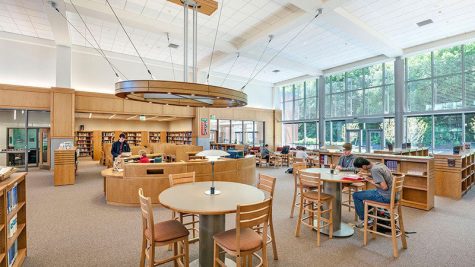
Just days before the announcement, Baker had come under fire from the Massachusetts Teachers Association for waiting until now to extend the closure. The union released a statement demanding Baker close schools for good.
“Baker’s delay in taking action to initially close all schools – and the lack of guidelines early in the process for remote learning – both point to the necessity for clear direction & mutual understanding of everyone’s needs,” MTA President Merrie Najimy said in a Facebook post.
This announcement comes with the news that the White House has now designated Massachusetts as a “hotspot” for the COVID-19 crisis. Case numbers have soared to over 38,000, ranking behind just New York state and New Jersey nationwide. New York Gov. Andrew Cuomo, who has pulled his state past the peak of the curve, has vowed to send 400 ventilators to the Bay State if necessary.
Fortunately, many experts considered April 20 to be the peak of the crisis in Massachusetts as the surge in cases continues. Experts at Massachusetts General Hospital believe the worst is soon to be over, with hospitalizations projected to plateau soon.
“A lot of people still believe we are in a worst-case scenario, and that’s actually not true,” Peter Dunn, a vice president at Mass. General, told the Globe. “The curve is flattening even more, and it is due to all the many community and government-based efforts to minimize the spread.”
April 9
Wayland health officials revealed that the Wayland man who died from COVID-19 on April 2 had “little contact” with other town residents. There are 16 lab-confirmed cases as of April 5, with people over the age of 50 comprising 10 of the 16 cases.
Case and death numbers continue to climb statewide, but brightening news has emerged. Epidemiologists revised a model, reducing projected deaths from 8,254 to 5,625 in the Commonwealth by August. ICU bed shortage projections have also fallen by over 1,000.
Interestingly, new data from MIT researchers indicated that the case numbers in the state may be exponentially higher than what is commonly reported. The lab analyzed sewage from “a large metropolitan area in the state of Massachusetts,” suggesting that true case numbers in the sector may be up to 257 times greater than reported.
“On March 25, the area represented by the sample had approximately 446 confirmed cases of Covid-19,” the researchers wrote in their report. “Based on our sewage analysis, we estimate that up to 115,000 people are infected and shedding the SARS-CoV-2 virus.”
A possible explanation is the relationship between testing and infection. Up to a quarter of cases are estimated to be asymptomatic, resulting in no test or confirmation of infection, and many other people experiencing mild symptoms also do not get tested.
In Massachusetts, about 30% of tests come back positive.
April 4
A Wayland man in his 60s died from COVID-19 on Thursday. This marks the first death in the town, which currently has 16 lab-confirmed cases.
Public Health Nurse Ruth Mori announced the death at a televised Board of Health meeting, indicating that the man died shortly after being hospitalized. Mori deflected a question regarding whether or not the man lived in an adult living facility and noted that local health officials were only aware of the case after receiving an email on Friday morning.
The board unanimously recommended town residents to wear a face-cover when leaving the house, whether it be a mask, scarf, bandana or other cover.
Residents feeling ill should contact their primary care physician and the Wayland Board of Health at (508) 358-6805.
April 2
WPS Superintendent Arthur Unobskey issued a release detailing “Phase 2” of WPS online learning. WSPN distills the memo here:
District-Wide Info
Phase 2 and all the standards attached will roll out on Monday, April 13. The district will not cancel April vacation, which is scheduled from April 20 through April 24. This means that teachers will neither assign work nor teach classes throughout those days.
Phase 2 will continue until May 4, the date which Gov. Charlie Baker has currently set the statewide school closure to end. Guidelines may be re-evaluated if the date changes.
High School
While Phase 1 (March 19 to April 7) restricted the advancement of course curriculum, teachers will have more leeway to push out material for new topics in Phase 2. District officials expect students to spend three-and-a-half hours on schoolwork from Monday through Friday every week.
Regarding grading, students will receive a combined Pass/Fail grade for both third and fourth quarter regardless of when they return to school, if they do at all. Teachers expect students to complete assigned work in Phase 2, but given the circumstances surrounding the lethal coronavirus and the inherent imbalances of online learning, WHS thought a Pass/Fail grading system to be most appropriate for evaluating student progress.
Regarding an end-year grade average, high school administrators are currently working on integrating the second semester Pass/Fail system with the numerical grading system from first semester.
Regarding testing, teachers are expected to assign no more than a few, if any, large-scale assessments during which students are directed to apply large amounts of information and varied skillsets. WHS will also not administer final exams in June due to the imbalanced levels of teaching throughout the year.
Middle School
Likewise with the high school, assigned work will no longer be optional beginning April 13. Teachers will continue to reinforce previous curriculum topics along with introducing new ones.
Regarding grading, students will receive a Pass/No grade for third quarter and for the portion of fourth quarter that the school remains closed. Students who do not earn a passing grade will receive a “No Grade” designation rather than a “Fail.”
Elementary Schools
Teachers will continue to introduce enrichment activities and attempt to limit the number of assignments that require screen use. Schools will not officially hold parent-teacher conferences, which are generally used to gauge a student’s progress. Parents, however, are welcome to individually contact teachers to learn more about their child’s performance.
March 31
The number of positive COVID-19 testings in Massachusetts has more than tripled to 5,572 in less than a week. Statewide, there have been 42,793 people tested for the virus. Monday, however, marked the first day in several that the case total did not increase by a larger margin than the day before.
Despite this, testing, case and death numbers continue to rise significantly, indicating that the coronavirus is not nearly done with the Commonwealth. Gov. Charlie Baker notes that he expects the state to see a surge in COVID-19 cases between April 7 and April 17, continuing that he may extend the forced closure of non-essential businesses beyond April 7.
The peak in Massachusetts is estimated to be on April 14 according to a model by University of Washington researchers. The state, however, will need 2,655 more hospital beds to deal with the incoming climax period, which may see up to 80 people die every day. The model projects a total of 1,782 deaths by Aug. 4, 2020.
The University of Washington model aligns with federal projections, which indicate that the nationwide death toll may surpass 100,000 as per a Sunday release by Dr. Anthony Fauci, director of the National Institute of Allergy and Infectious Diseases.
Researchers from Northeastern University, however, worry that these projections may underestimate the severity of the virus and paint an optimistic future. Samuel Scarpino, an assistant professor network spread and diseases at Northeastern, suggests that the nationwide death toll could top 1 million.
Scarpino furthers that Massachusetts hospitals will “inevitably” be overwhelmed during the April surge, but the state, along with the nation, may be able to relax social distancing guidelines by the summer. For now, citizens should continue to heavily limit contact with others.
“Every transmission event that you prevent from happening will down the line lead to tens or hundreds of other cases that don’t happen,” Scarpino told NBC Boston.
Below is an update on state case numbers by age group:
0-19: 122 cases (2%)
20-29: 953 cases (17%)
30-39: 1,031 cases (17%)
40-49: 948 cases (16%)
50-59: 1,088 cases (19%)
60-69: 802 cases (14%)
70+: 801 cases (14%)
March 25
Gov. Charlie Baker extended statewide school closures to the end of April, meaning that the earliest schools can reopen is on Monday, May 4. This is a nearly month-long extension from the previous closure deadline of April 7.
Baker also ordered grocery stores and pharmacies to allocate at least an hour every day for only senior citizens to shop. This will minimize the spread of COVID-19 in these stores and allow seniors, the most vulnerable to the disease, to acquire essentials at a lower risk of contraction.
The state, which issued a stay-at-home advisory on Monday, urges residents to continue practicing social distancing. The next step in escalating state mandates would be a shelter-in-place order, which would likely force residents to stay at home for all purposes aside from conducting essential activities.
As of today, Massachusetts coronavirus case totals have soared to 1,838, rising by 58% from the day before as testing ramps up. 15 deaths have been reported, the last four of which were all citizens with pre-existing conditions in their 70s or 80s.
Below is the current distribution of coronavirus cases among age ranges in Massachusetts:
0-19: 41 cases
20-29: 326 cases
30-39: 322 cases
40-49: 313 cases
50-59: 330 cases
60-69: 249 cases
70+: 255 cases
March 22
Gov. Charlie Baker issued a statewide order Monday morning to close all non-essential businesses until April 7 at noon. Grocery stores, pharmacies, gas stations, restaurants with take out/delivery services, medical suppliers and manufacturers and medical marijuana shops will remain open.
The order will take effect tomorrow at noon and comes along with the news that the number of known coronavirus cases in the state has topped 600, resulting in five deaths.
Baker urges residents to stay indoors during this time period, but he reaffirms that Massachusetts is not issuing a shelter-in-place mandate as is the case in New Jersey, California, New York, Illinois and Connecticut.
“I do not believe I can or should order U.S. citizens to be confined to their homes for days on end,” Baker said in a press conference. “It doesn’t make sense from a public health point of view, and it’s not realistic.”
Other public authorities, however, are applying pressure on Baker to issue a shelter-in-place order. More than 50 elected officials in state and local positions have signed a letter requesting that Baker issue the order immediately. State Rep. Mike Connolly of Somerville cites the need to emphasize the urgency of the situation.
“We’re hearing way too many examples of people who aren’t taking this seriously, or people who want to take this seriously but are being pressured to go into work,” he said. “That’s why we’ve been calling on Gov. Baker to issue a shelter-in-place or a stay-at-home order.”
March 21
The CVS at 150 Main St. has temporarily shut down due to an employee testing positive for COVID-19 today. According to a Wayland town administrator report, anyone requiring immediate assistance with a prescription should turn to the CVS store at 325 Boston Post Rd. in Wayland.
This comes with the news that the number of total Massachusetts coronavirus cases has spiked to 525, increasing by 27% from the day before. The 525 cases constitute the positive portion of the 5,207 total testings in the state in both commercial and state labs. 61 of the patients are hospitalized, and 215 are not hospitalized – the hospitalization status of the remaining 249 cases is currently unknown.
“As the testing numbers go up and as the criteria by which you can be tested expands, we certainly expect that we will see an increase in the number of positive test cases, as well,” Gov. Charlie Baker said.
March 20
Massachusetts has experienced its first COVID-19 death. An 87-year-old man in Suffolk County died today according to the Massachusetts Department of Public Health. The man had pre-existing conditions that expanded risk to his health and had been hospitalized prior to his passing.
“I extend my heartfelt sympathies to the family and friends who lost their loved one,” Gov. Charlie Baker told WWLP. “We are living in uncertain and challenging times, and our administration is bringing every available resource to bear in the fight against this disease.”
The death comes with the news that the state now has 328 known coronavirus cases, a 72-case increase from the day before, the largest single-day jump to date. Middlesex County continues to report the largest case numbers, with 119 as of today. The state pushed out 861 additional testings on Thursday, a significant ramp-up to 3,132 total testings.
March 19
Two Wayland restaurant employees tested positive for COVID-19 today, shutting down the restaurants indefinitely. The two employees worked at Starbucks and Liberty Pizza on Main St. in relatively close proximity with each other.
This development raises the number of known cases in Wayland to three. Neighboring Framingham has four cases, Natick has three and Sudbury has one. There are currently 328 total presumptive positive or confirmed cases across the state.
As the threat of coronavirus continues to infect more and more aspects of daily life, WSPN conducted a poll of 332 anonymous WHS students to help illuminate how WHS students are dealing with the crisis and the subsequent school closure. Here are the results:
March 18
Massachusetts continues to be one of the states hit hardest by the novel coronavirus. Cases spiked to 256 as of today, increasing by 38 from the day before. Fortunately, there has not yet been a recorded death in the state due to the disease.
State hospitals, however, are already becoming increasingly overwhelmed with the influx of patients. Massachusetts General Hospital estimated that the number of suspected COVID-19 patients quadrupled just from Monday to Tuesday, and testing has yet to be implemented or return on a grander scale.
“This is clearly escalating at a very rapid pace,” Dr. Peter Slavin, president of Massachusetts General Hospital, told the Boston Globe.
Gov. Charlie Baker has dismissed rumors that the state would soon issue a shelter-in-place order, which would force residents to stay indoors barring specific and extreme circumstances.
March 17
WPS Superintendent Arthur Unobskey will send an email to families this afternoon detailing district guidelines for how teachers are to utilize “enrichment days” during the school closure. WHS Principal Allyson Mizoguchi will send a high school-specific update on Wednesday. The guidelines will be constructed with Massachusetts Department of Elementary and Secondary Education recommendations in mind.
Overall, Mizoguchi states that the high school will adopt the policy that teachers are not to advance the curriculum with mandatory work. Teachers may give out optional work, but students will not be formally assessed on any material assigned during the closure or be responsible for the material following their return to the high school.
Enrichment days are scheduled to begin on Thursday, March 19. There will be no grades given during these enrichment days.
March 15 at 6:46 p.m.

Schools have been shut down until April 7 by a statewide order. Restaurants will only serve take-out, and gatherings of more than 25 people are prohibited.
Schools will be shut down until April 7, extending the closure from March 27 for Wayland Public Schools. This comes from a statewide order by Gov. Charlie Baker today. The shutdowns come along with orders to suspend non-takeout restaurant activities and prohibit any gatherings of more than 25 people.
The orders will begin Tuesday to give the Commonwealth time to adjust. The number of cases statewide has jumped to 164, with 799 testings as of Sunday.
Baker encourages schools to employ alternative educational systems in the meantime. There are 23 days until schools are scheduled to reopen, 17 of which would have been school days. State authorities also advocate for social distancing, which is maintaining a six foot distance from others.
“We will not be doing our part to prevent the spread if there are a ton of kids hanging out playing video games and sharing snacks every day from one house to the next,” Baker told CBS.
March 15 at 12:14 p.m.
With two weeks of school closure underway, the Wayland Board of Health, along with other town authorities, released guidelines for how residents should behave during this crisis. The board “urgently” recommends families to practice “social distancing” to slow the spread of the coronavirus.
Social distancing, which generally indicates staying at least six feet away from people, allows for generally individual and/or outdoors activities. The board suggests that people should engage in such activities and refrain from attending gatherings where they cannot practice social distancing.
If a Wayland resident feels or believes they may have contracted the coronavirus, they are directed to contact the Wayland Coronavirus Hotline at (508) 358-6805 and their primary care physician.
Across Massachusetts, the number of known cases has jumped to 138, the second consecutive day of a 15+ case increase. These 138 presumptive positive cases come from 475 testings across the state, and 104 are linked to the Biogen conference in late February. Nearly half of the cases are in Middlesex County.
In response, Gov. Charlie Baker recently opened a Coronavirus Command Center for the state to expand testing and enhance communication.
March 12 at 5:18 p.m.
All Wayland Public Schools will be closed from Friday, March 13 to Friday, March 27 according to an email release at 5:11 p.m. by WPS Superintendent Arthur Unobskey. All extracurricular activities and spring sports will not take place during this time period. The district plans to reopen on Monday, March 30.
Teachers will begin to plan online lessons, which Unobskey hopes will launch en masse by the middle of next week. The district and the Wayland Teachers Association aims to “minimize disruption to learning.”
While the current closure is scheduled for two weeks, the district may extend the closure period depending on the state of the outbreak once it’s completed.
“Given the evolving nature of this pandemic, it may be necessary to extend the current closure,” Unobskey wrote in the email. “If any extension is necessary, we will communicate proactively.”
The Wayland Health Department advises any residents with concerns that they may have contracted COVID-19 to contact the Wayland Coronavirus Hotline at (508) 358-6805.
March 12 at 1:56 p.m.
Claypit Hill Elementary School will shut down early today as a Claypit parent and student have both potentially contracted COVID-19. According to an email release at 12:14 p.m. by WPS Superintendent Arthur Unobskey, both individuals “may have been exposed” to the coronavirus and are symptomatic. The student was not in school today, but they were in school earlier this week.
Unobskey noted that teachers should be prepared to bring materials home, indicating that further school closures within the district may be imminent.
WHS Principal Allyson Mizoguchi furthered through a 1:46 p.m. email that the possibility of a high school closure is becoming “more and more likely” and that Unobskey would be pushing out an update regarding this issue by the afternoon.
“I am asking that today, [students] leave [the high] school with the understanding that school may be closed for an extended period of time,” Mizoguchi wrote in the email.
March 11
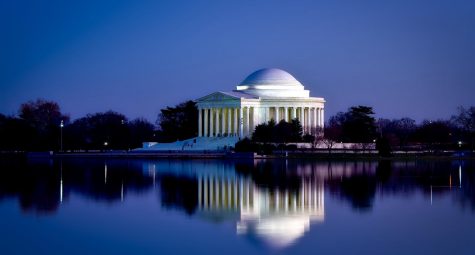
The D.C. trip, a staple of the eighth grade Wayland Middle School experience, has been canceled. WMS will “look into” the possibility of rescheduling the trip at some point later in the year. This comes with the announcement that in-state field trips will be “limited significantly” and that school-specific gatherings are at risk of cancellation as well.
The eighth grade D.C. trip and the journalism Nashville trip were canceled by the Wayland Public Schools district today according to an 8:26 p.m. email release by Dr. Arthur Unobskey, the district’s superintendent.
Unobskey indicated that the district will also be “limiting in-state trips significantly,” and school principals will be notifying their communities of potentially canceling school-specific gatherings.
Along with the trip cancellations came the announcement that Loker Elementary and Wayland Middle School students will return to school tomorrow on Thursday, March 12 following the completion of a deep disinfection.
Regarding further school closures within the district, Unobskey recognizes the benefit that closures could have in limiting the spread of the coronavirus but maintains that the situation has not escalated to a level that would warrant additional closures at this time.
“We do not yet have evidence that any of our students or staff have contracted COVID-19, and there is no educational substitute for having students in a physical classroom with teachers,” Unobskey wrote in the email.
The neighboring Weston Public Schools district will shut down all schools beginning Thursday, March 12 and reopen, at earliest, on Thursday, March 19. According to an email release by Weston Public Schools Superintendent Midge Connolly, two Weston students have possibly contracted COVID-19, and the district hopes the school closures will “slow the potential rapid spread of [the coronavirus].”
Connolly wrote that one Weston student is symptomatic, but their COVID-19 test came back “inconclusive.” A second student connected to a different coronavirus case is under quarantine at this moment. The district will continue with its disinfection process and re-evaluate next week whether or not students will be able to return to school on March 19.
The policy regarding online classes is relatively lax – Connolly indicated that teachers could start developing online lessons “if the need arises.” Regardless of how long the school district is closed or how intensely online classes are implemented, the Massachusetts State Department of Education has determined that the last school day for Weston Public Schools will be Friday, June 26.
March 10 at 10:47 p.m.
A Wayland parent recently tested positive for COVID-19 according to an email release by WPS Superintendent Arthur Unobskey at 10:25 p.m. The parent has children who attend Loker Elementary School and Wayland Middle School, and both schools will be closed on Wednesday, March 11 for a deep disinfection as per protocol.
The parent was exposed to the coronavirus last week and subsequently entered self-quarantine, and their two children were also self-quarantined as of Monday this week. Neither child currently exhibits any symptoms, leading Unobskey to state that the town “[does] not have reason to believe that the students were contagious or that students and staff in the two buildings were exposed to COVID-19.” Unobskey furthered that members of the two school communities need not consider a self-quarantine at this time.
Happy Hollow Elementary, Claypit Hill Elementary and Wayland High School will have school as scheduled.
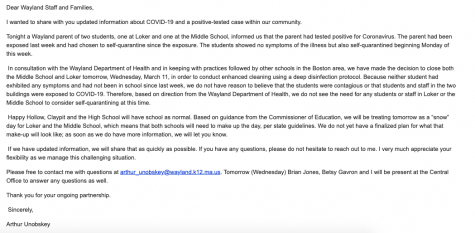
Across Massachusetts, Gov. Charlie Baker declared a state of emergency this afternoon as the number of in-state cases more than doubled to 92, with about half of the total cases located in Middlesex County. A state of emergency allows the state to more easily supplement local resources and bypass some federal and state laws in an effort to contain or stop a “disaster.”
Massachusetts joins 12 other states in New York, California, Washington, Florida, Oregon, Utah, Maryland, North Carolina, Kentucky, Colorado, Ohio and New Jersey with this declaration.
March 10 at 12:37 p.m.
One Sudbury resident tested positive for COVID-19 and notified the Sudbury Board of Health on Monday night, according to a town release. The resident is recovering at a hospital, and their family members, who are currently not connected with Sudbury Public Schools or Lincoln-Sudbury Regional High School, are in self-quarantine.
Across Massachusetts, the number of presumptive positive cases has increased to 41, a 13-case jump from the tally on March 8. These cases include an elementary student from Stratton Elementary in Arlington and the town manager of Norwood. Nine of the 41 cases are not connected to the February Biogen conference, indicating multiple sources of contagion. State health officials state that the risk of contracting the coronavirus remains low for the general public.
March 8 at 7:34 p.m.
A parent of two Natick High School students has tested positive for COVID-19. The two students are asymptomatic and are undergoing self-quarantine for 14 days. The high school will open as scheduled on Monday, March 9. This information was distributed through an email by Natick Superintendent of Schools Anna Molin and Natick Board of Health Director Jim White.
March 8 at 7:04 p.m.
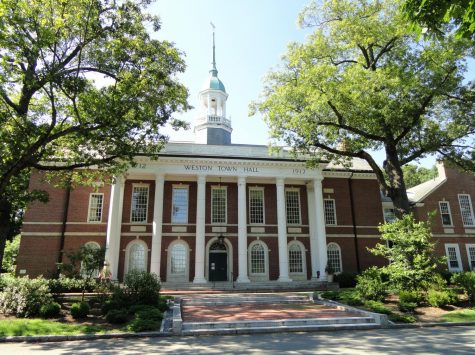
Weston has experienced a recent increase in presumptive positive coronavirus cases as residents linked to the first few Biogen cases are tested.
Several Weston-based Biogen employees have tested positive for coronavirus. Employees are currently instructed to avoid the Weston Biogen office, which is located at 133 Boston Post Rd., until the sanitization process has completed.
A Lexington resident also tested positive for COVID-19 on March 7 and is currently in self-quarantine. According to the Lexington Board of Health, two of the resident’s family members are students at Bowman Elementary School. The students, who are asymptomatic, will be quarantined for 14 days.
Across Massachusetts, the number of confirmed or presumptive positive cases (positive testings that are not yet confirmed by the Center for Disease Control) has spiked from 13 to 28 over the weekend according to state health authorities. All 15 new cases are directly linked to the Biogen conference in late February that sparked the spread of known coronavirus cases in Massachusetts.
March 6 at 6:06 p.m.
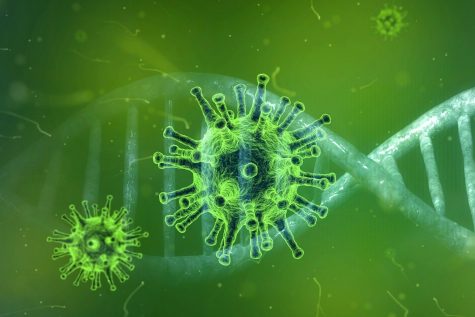
A parent from neighboring Weston has potentially contracted the coronavirus. According to an email sent by Weston Public Schools Superintendent Midge Connolly, she received communication from a Weston Middle School parent in the afternoon that they had been exposed to COVID-19 and were “not feeling well.”
While this does not constitute a confirmed or presumptively positive case, the district shut down all Weston Middle School activities for the weekend so that the building can be thoroughly cleaned and disinfected before reopening its doors on Monday.
This news follows the noon confirmation that COVID-19 had spread to nearby Wellesley after a Wellesley parent tested positive for the virus, shutting down two district schools early.
Across Massachusetts, the number of cases has jumped to eight within the day. Gov. Charlie Baker states that while the general public remains at low risk for contracting the coronavirus, the state is “planning and preparing for the potential of more cases to develop.”
March 6 at 1:50 p.m.
Two Wellesley public schools were dismissed early at 11:45 a.m. following the positive COVID-19 testing of a Wellesley resident. The resident is a parent of children who attend Upham Elementary School and Wellesley Middle School.
Fortunately, the children are currently exhibiting no symptoms of the coronavirus. Nonetheless, the district will take precautions to take the rest of the day to fully sanitize the school buildings.
Wellesley Public Schools Superintendent David Lussier sent an email at 11:21 a.m. to notify parents of the presumptive positive case.
In Wayland, WPS Superintendent Arthur Unobskey notified community members through email that domestic school-sponsored field trips such as the eighth grade D.C. trip are currently scheduled to take place without interruption or cancellation.
March 5

Following Gov. Charlie Baker’s plea for schools to cancel international field trips, WHS has officially canceled the eastern Europe trip headed by history teacher Ellen Cheeseman-Meyer and the France trip headed by French teacher Sara Langelier.
There are now three COVID-19 cases in Massachusetts. According to the Boston Globe, Biogen employees tested positive for the virus after attending a meeting in Cambridge offices. This comes along with positive testing for a 60-year-old Middlesex County woman who recently traveled to northern Italy.
These cases derive from the 25 official COVID-19 tests conducted in the state since January. Currently, 249 Massachusetts residents are still subject to self-quarantine.
The first Massachusetts school to shut its doors, Mystic Valley Charter School in Malden, did so for the entire week of March 2 due to coronavirus concerns.
March 4
WPS Superintendent Arthur Unobskey delivered an update to faculty members and parents on March 4 regarding Wayland’s response to the coronavirus. Unobskey wrote that students should follow common preventative measures such as washing their hands and staying at home if they experience flu-like symptoms. While the possibility of school closure is “unlikely,” town officials are developing contingency plans if such a scenario manifests.

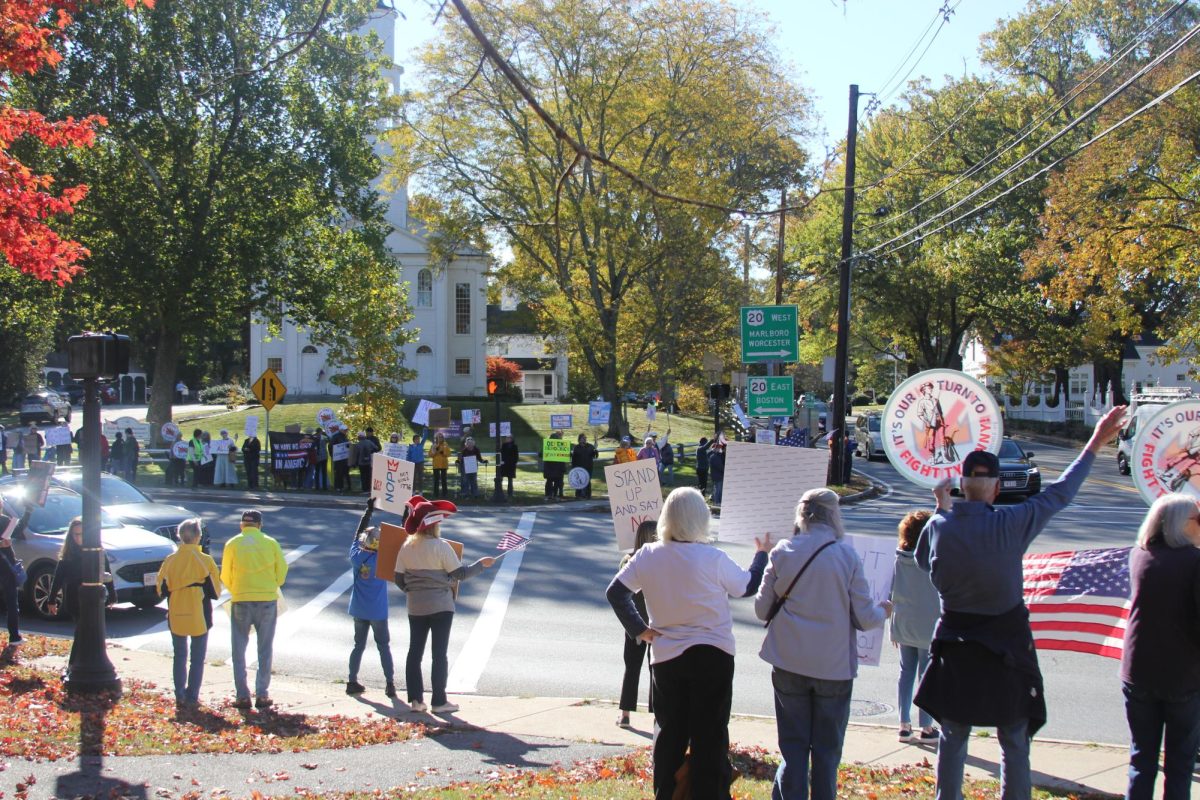









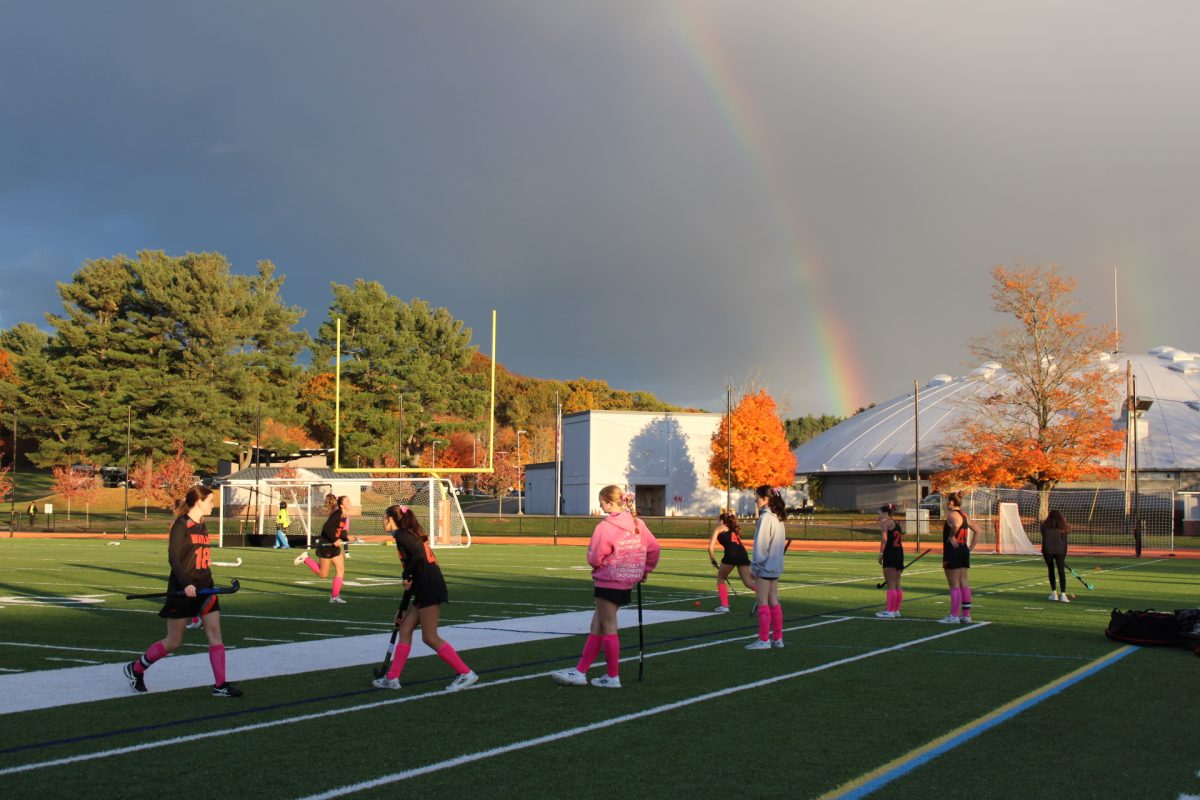
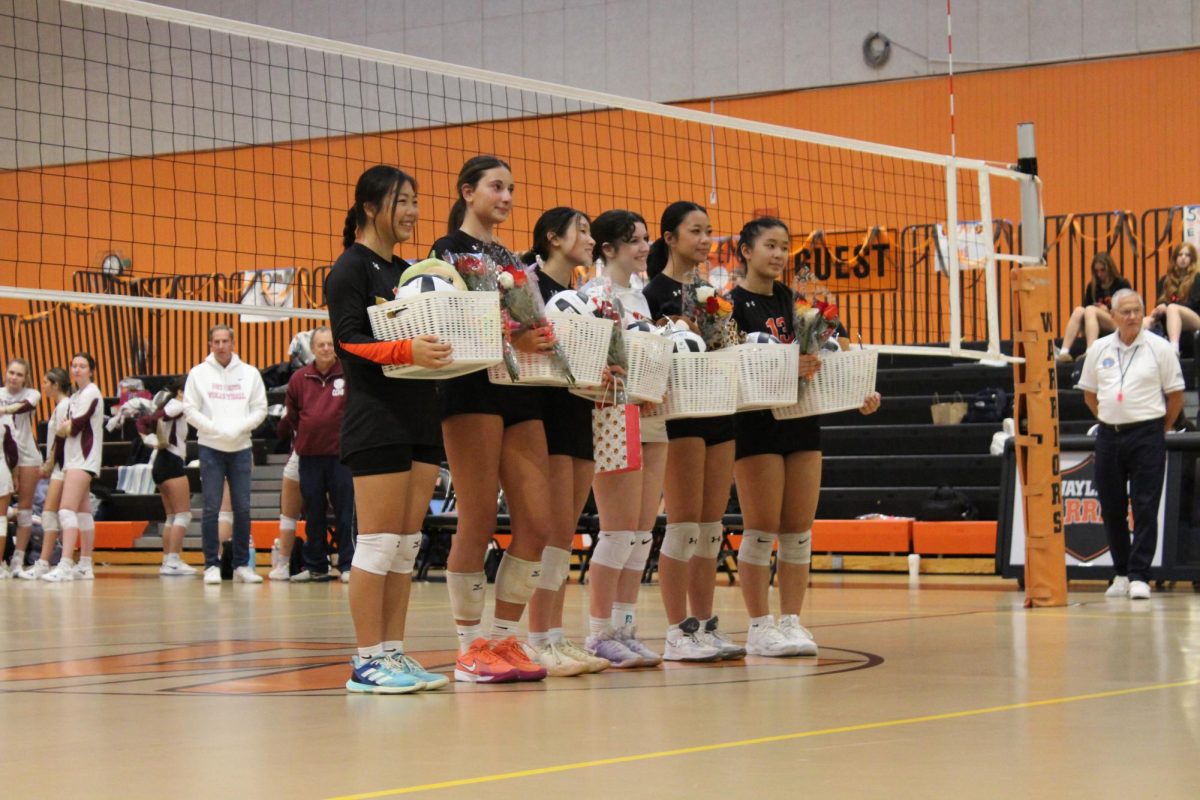

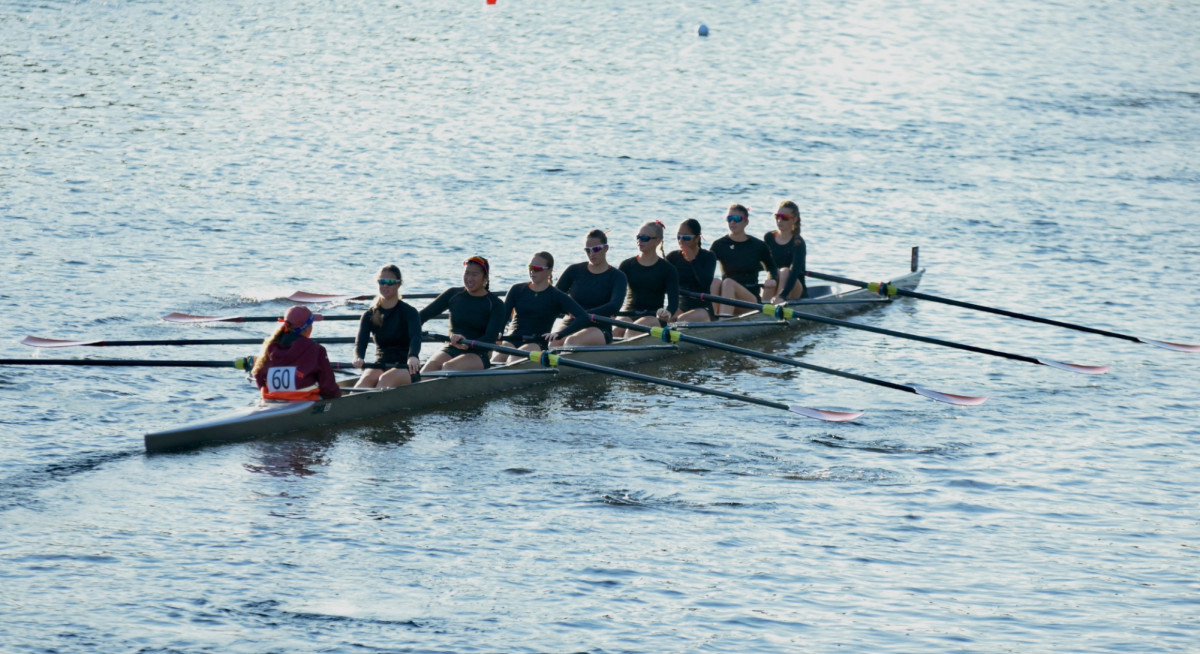
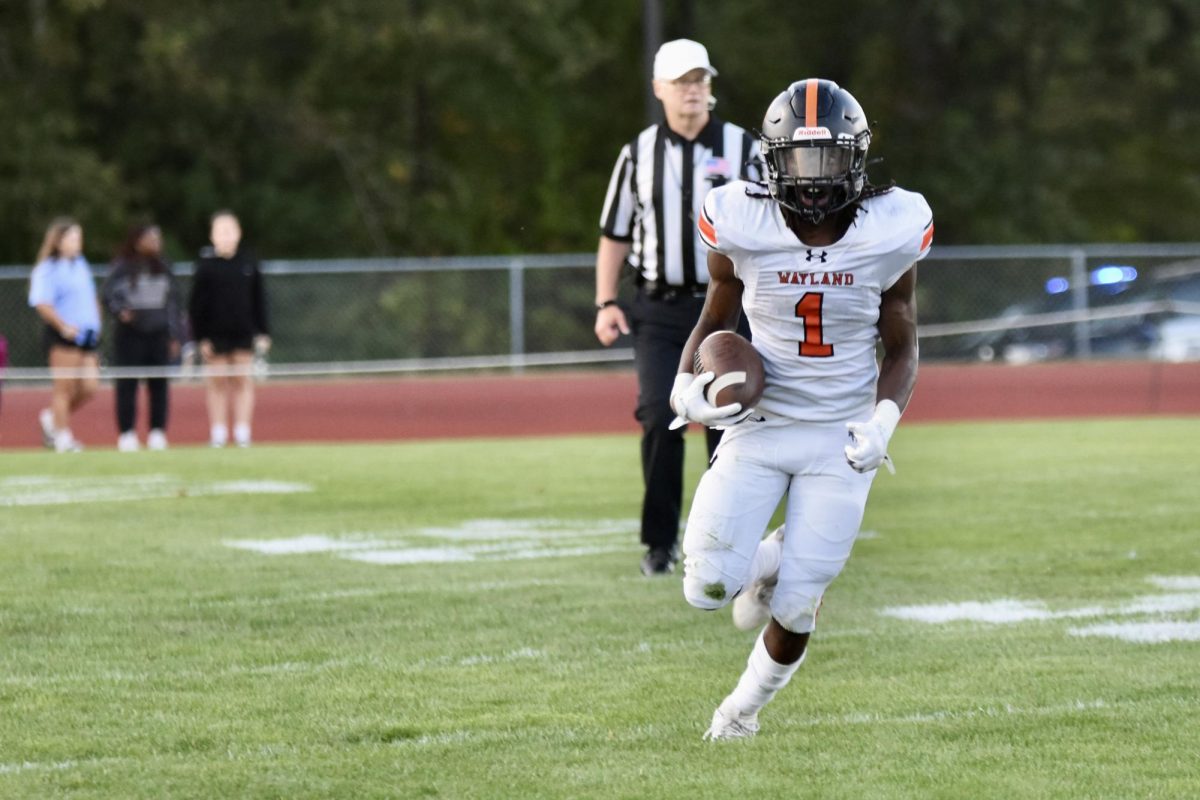






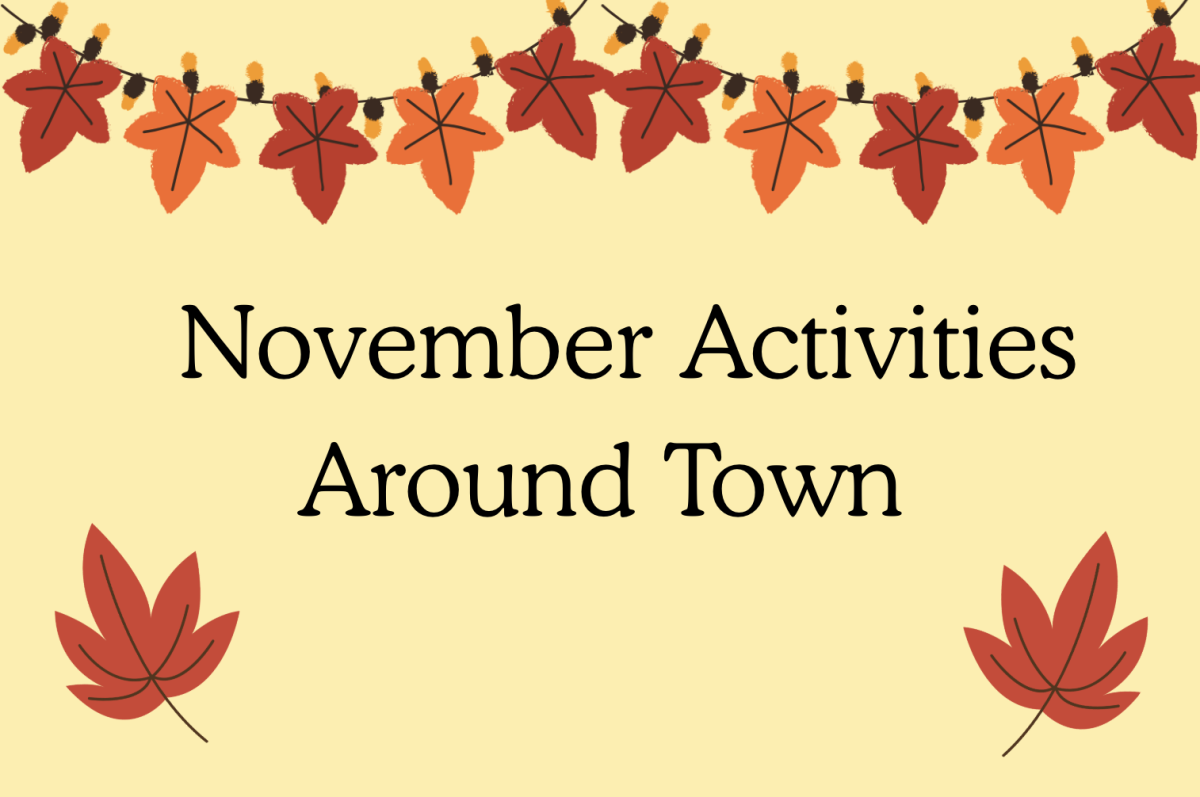




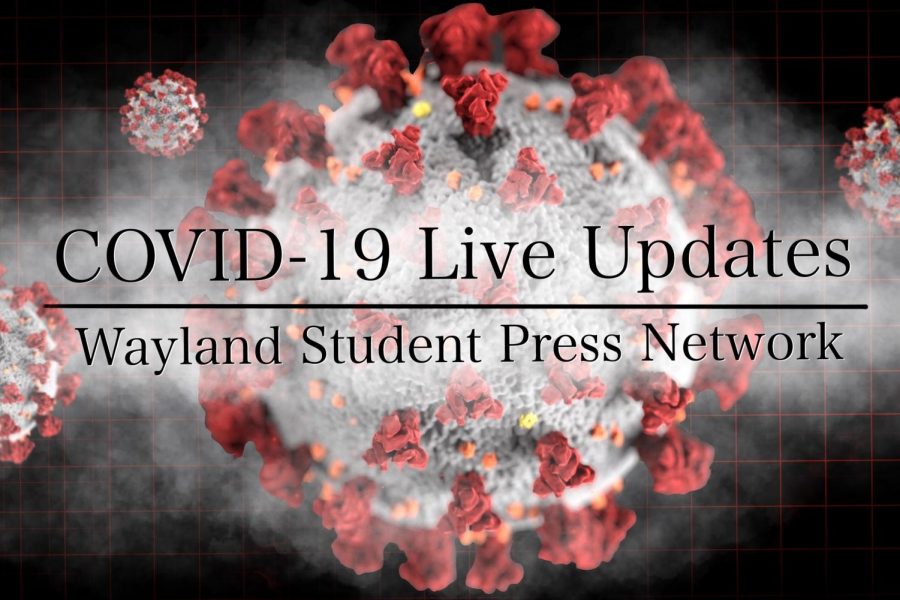
David D • Mar 13, 2020 at 9:23 AM
Hey Kevin,
I
This is a real public service and lesson to others how anyone can make a difference. You took charge and presented reliable and useful info in a format that is both comprehensible and relevant. I’m accessing it from Cape Cod for my brother who is living in Wayland with 2 kids. Thank you very much!
Dr. David D.
All WHS Students • Mar 12, 2020 at 7:10 PM
I’m abt to be so bored for the next 18 days
Paul Hambelton • Mar 12, 2020 at 4:52 PM
Nice update Kevin. Appreciate you getting the latest news out.
I. Love. Kevin • Mar 11, 2020 at 11:57 PM
The coronavirus scares me, but Kevin Wang’s comprehensive, in-depth coverage of the crisis is the pill I need to sleep soundly in these dark times.